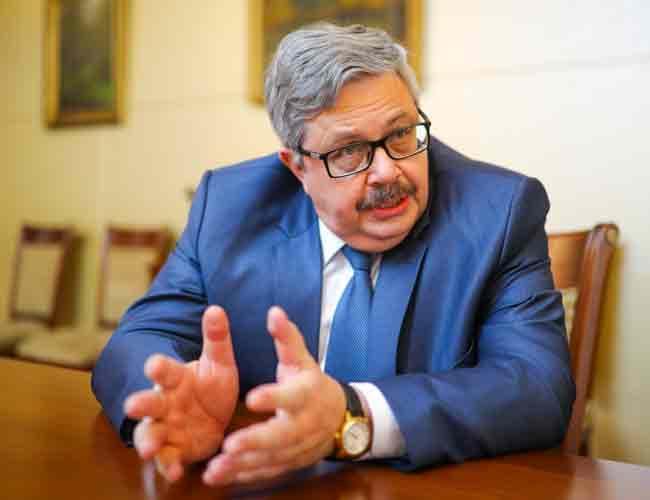
Moscow counts on Turkish President Recep Tayyip Erdoğan on a smooth finalization of the S-400 missile system purchase, the Russian ambassador to Ankara has said, downplaying recent U.S. statements against the agreement.
“What I can tell you is that some declarations were made on this particular issue by President Erdoğan. I think we should trust him, we should listen to him. When President Erdoğan tells me something, I trust him, so you may follow suit,” Ambassador Alexei Yerhov told Hürriyet, in response to a question on the S-400 agreement in an interview on April 4.
The U.S. announced on April 1 that it would be suspending all “deliveries and activities” related to Turkey’s procurement of the F-35 stealth fighter jet over Ankara’s plans to purchase S-400 systems but before and after the statement, Turkey repeatedly called the agreement with Russia a “done deal” and that it will not step back.
On April 3, Russian Deputy Prime Minister Yury Borisov told reporters in Moscow that Ankara has “distinctly” fulfilled its obligations undertaken under the contract.
Delivery of Russian S-400s to start in June: Turkish official

“We have no concerns,” he said.
Turkey and Russia are on the same page regarding their Syria policies, according to Yerhov.
“Even more – on the same side of history, in one boat,” he said.
“The Russian-Turkish cooperation in Syria has been very efficient – what we already achieved as guarantors of the Astana process together with Iran is a very good example of how like-minded states can act to stop the bloodshed and bring peace to war-torn peoples and territories. This is exactly what we have done in Syria where so-called de-escalation zones were created, where the cessation of hostilities enabled the people to restore a normal and peaceful life, to start rebuilding their country after eight years of the devastating conflict,” he said.
Still, there is a lot more to be done, he said.
“We have Idlib today, where terrorists from Hayat Tahrir al-Sham play the master in the province, continuing their aggressive provocations which result in victims among both military and civilians,” he said, referring to the former Al-Qaeda offshoot.
“Such a situation needs solution, and urgent solution and our military have already started coordinated effort aimed at the implementation of the Memorandum on Idlib signed in Sochi in September last year,” he said.
“We all know that a real peace, durable and long-lasting, can only be achieved by political means,” he also said.
“We need a political process leading to a negotiated solution.
The diplomat preferred not to comment on the content of the Moscow summit of Erdoğan and Russian President Vladimir Putin on April 8, saying that “our statesmen themselves make the agenda,” adding that it will cover a wide range of issues, including the Syrian war, trade ties, the ongoing Akkuyu nuclear plant project in Turkey and the Turkish Stream natural gas project.
However, he elaborated on Russian Foreign Minister Sergey Lavrov’s meeting with Turkish Foreign Minister Mevlüt Çavuşoğlu in Antalya on April 29.
Apart from tête-à-tête meeting our two ministers co-chaired the seventh meeting of the Joint Strategic Planning Group, he noted.
“I should mention that the talks were held in a constructive atmosphere and the results of the meeting demonstrated a high level of understanding between our two countries, reaffirmed the importance of our political dialogue for enhancing international and regional security.”
The ministers also reviewed developments in the south Caucasus, Central Asia and the Black Sea regions. They discussed ways to facilitate more efficient cooperation in international organizations.
Bilateral trade between Russia and Turkey is increasing, Yerhov noted.
“Last year this figure exceeded $25 billion; that means the rise by 16 percent compared to 2017 and still the figure is four times smaller than the goal set by our presidents. So, we have to proceed working hard in search of new areas.”
“Russia is not only Moscow, St. Petersburg or Kazan. It covers a huge territory, possesses rich natural resources, highly skilled workforce and a huge domestic sales market. I invite Turkish business to be more active in other regions, including Siberia and Far East, including Crimea, where a large Turkic community lives and which witnessed rapid economic growth during last five years with infrastructure facilities actively constructed and restored. I mean primarily the Crimean Bridge, a new terminal of Simferopol Airport, the Tavrida motorway and so on,” he said.